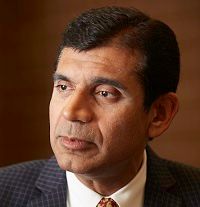Article
Hurricane Katrina Revisited: One Doctor's Story
Author(s):
Hurricane Katrina devastated New Orleans 11 years ago. A physician and colleagues documented "Post Katrina Stress Disorder" tells how he came to do the study, and what the disaster was like for him.

Eleven years ago when Anand Irimpen, MD, chief of cardiology at Tulane Heart and Vascular Institute got the word that a hurricane was about to hit New Orleans, he and his endocrinologist wife and 14-year-old son packed up and started looking for a hotel far enough away that they could safely ride out the storm. (Photo courtesy of the AHA by Edmund D. Fountain).
“It was what we always did,” he said, “I wasn’t on call so I left town—it was a routine evacuation.”
That hurricane was Katrina, and when the levees broke, it was a major disaster. There was nothing routine about it.
Irimpen and his family ended up in Mississippi and wouldn’t be able to return for months. He found a way to keep working. They moved again.
Since he had a part-time Veterans Administration appointment in New Orleans, he was able to spend time working at a VA hospital in Dallas, TX, returning to Tulane to see patients on alternate weekends, and later living for a year in a rented condo in New Orleans.
On the weekends he returned, “It was a whole different city, desolated, very quiet, an eerie quiet,” he recalled, reflecting on the ordeal in an interview at the American Heart Association's Scientific Sessions in New Orleans, LA.
Katrina was a major disruption for the family.
His son had to change schools and sports teams, their home in nearby Metairie got inundated with a foot of water, they lost some possessions and the theaters and music venues that help make New Orleans attractive to Irimpen went dark for months. But he and his family coped. “We were very fortunate,” he said.
Life has mostly returned to normal for the city and physicians who work here.
The city’s hospitals have since undergone major reorganizations, with Charity Hospital and the New Orleans Veterans Administration facility closing due to the high projected cost of rebuilding after the storm. Instead,a new hospital University Medical Center has opened, and a new VA facility will open later this week.
But as his cardiology practice and faculty duties slowly returned to normal, Irimpen said, he started getting complaints from the fellows he was training.
They were constantly getting called in on their scheduled time off to treat patients with heart attacks. Initially, he said, he was skeptical that there were actually more heart attacks happening.
But that was the impetus for his study, one that found that not only were there more heart attacks immediately following the hurricane, but fully a decade later.
Katrina was much more than a traumatic event, it changed how people took care of themselves, for years afterwards.
“I called it Post-Katrina Stress Disorder,” he said.
People stopped taking medications because they were more worried about their homes, their possessions, and often their lost jobs.
In some cases they started smoking, or turned to substance abuse.
They stopped exercising, sometimes because their health clubs were gone.
There were no mobile health clinics or mobile pharmacies so until the city rebounded, a years-long process, some people just stopped taking care of their health, he said.
Charity Hospital was the main provider of care for the uninsured, and when it closed, many people had no place to go if they had no health coverage.
The lesson for emergency management officials, physicians, and others should be that in future disasters, these needs should be expected, he said.
Hurricanes were once rare events, but no longer seem to be that way.
“We’ve been lucky for a few years,” he said. That could change.





